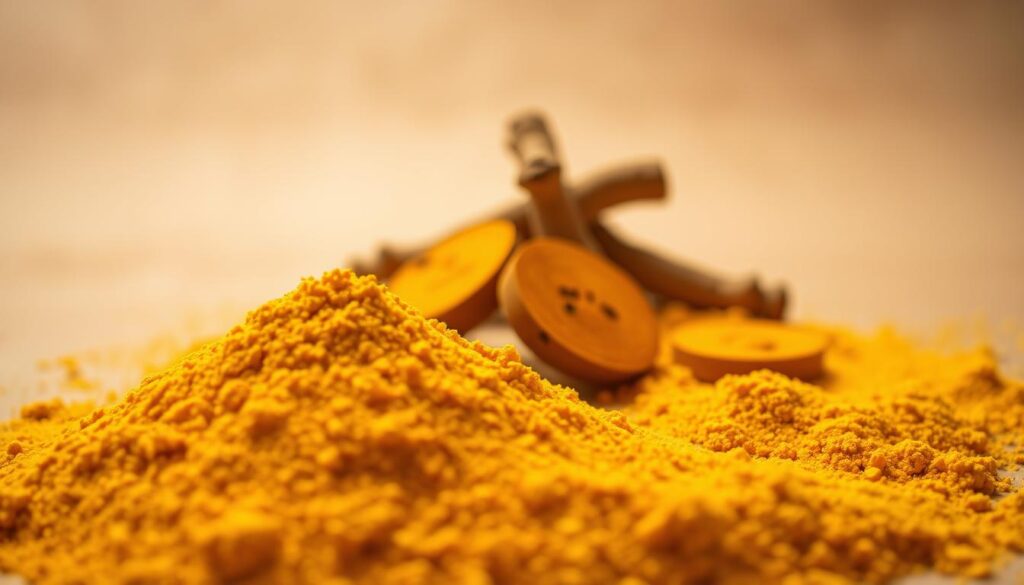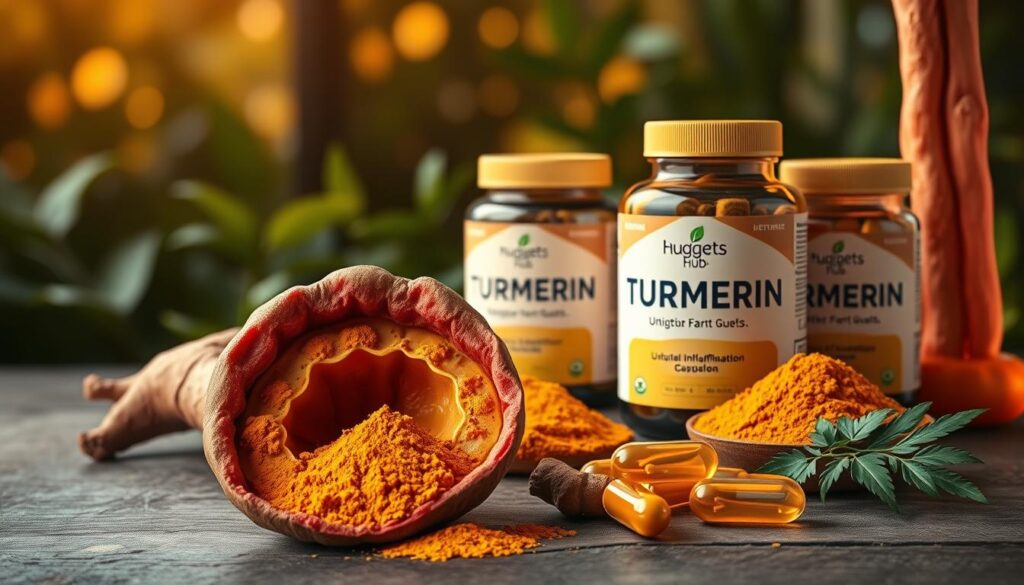Are you struggling with chronic inflammation, joint pain, or fatigue? Turmeric, a golden-hued spice used for centuries, might be the solution you’ve been searching for. Research suggests that its active compound, curcumin, can reduce inflammation by up to 30%. This natural antioxidant has been celebrated for its healing properties and is backed by science.
Turmeric isn’t just a flavorful addition to your meals; it’s a powerhouse for your health. When paired with black pepper, its absorption increases significantly, making it even more effective. Whether you’re dealing with brain fog, joint discomfort, or weakened immunity, turmeric offers a natural way to feel better.
In this article, we’ll explore how turmeric works, why it’s so effective, and how you can incorporate it into your daily routine. Get ready to discover a simple, evidence-based approach to reducing inflammation naturally.
Key Takeaways
- Turmeric can reduce inflammation by up to 30%, according to research.
- Curcumin, its active compound, is a natural antioxidant with powerful benefits.
- Pairing turmeric with black pepper enhances its absorption.
- This spice supports joint health, brain function, and immunity.
- Learn practical tips to incorporate turmeric into your daily routine.
Introduction: Understanding Inflammation

Inflammation plays a dual role in your body—it can heal or harm. At its core, inflammation is your immune system’s response to injury or infection. It’s a natural process that helps your body repair and protect itself. However, when inflammation becomes chronic, it can lead to serious health issues.
What is Inflammation and Why It Matters
Inflammation is your body’s way of fighting off harmful invaders like bacteria, viruses, or toxins. When you get a cut or catch a cold, your immune system triggers acute inflammation. This type of inflammation is short-term and essential for healing.
Chronic inflammation, on the other hand, is a different story. It occurs when your body’s defense system stays active for weeks, months, or even years. Over time, this can damage healthy tissues and lead to conditions like arthritis, diabetes, and heart disease.
The Dangers of Chronic Inflammation
Chronic inflammation is often called a silent threat because it can go unnoticed for years. Research shows it’s linked to a wide range of diseases, including cancer, Alzheimer’s, and autoimmune disorders. A study published in the Journal of Clinical Medicine found that chronic inflammation increases the risk of developing these conditions by disrupting normal cell function.
Your diet plays a significant role in managing inflammation. A plant-based diet, rich in fruits, vegetables, and whole grains, has been shown to reduce inflammatory markers like C-reactive protein (CRP). This is backed by research indicating that certain foods can either fuel or fight inflammation.
| Type of Inflammation | Duration | Impact |
|---|---|---|
| Acute | Short-term (hours to days) | Helps heal injuries and fight infections |
| Chronic | Long-term (months to years) | Damages tissues and increases disease risk |
By understanding inflammation, you can take steps to manage it effectively. Simple lifestyle changes, like eating nutrient-rich food and staying active, can make a big difference. The key is to keep inflammation in check before it becomes a problem.
Turmeric - The Golden Anti-Inflammatory Spice

For centuries, turmeric has been celebrated as a golden remedy in traditional medicine. This vibrant root, known for its deep orange-yellow color, has been a staple in both Ayurvedic and Chinese healing practices. Its rich history and powerful benefits make it a standout in the world of natural health.
Introducing Turmeric and Its History
Turmeric, a member of the ginger family, is a root that has been used for over 4,000 years. In India, it’s a key ingredient in curries, adding both flavor and color. But its role goes beyond the kitchen. In Ayurveda, turmeric is considered a balancing agent for the body, mind, and spirit.
Traditional Chinese medicine also values turmeric for its ability to support digestion and improve circulation. Its versatility has made it a trusted remedy across cultures. Today, modern science is uncovering why this ancient plant has stood the test of time.
Unveiling Curcumin: The Potent Active Compound
The secret behind turmeric’s power lies in its active compound, curcumin. This natural substance is responsible for the root’s vibrant color and many of its health benefits. Research shows that curcumin can help reduce oxidative stress and support overall wellness.
Studies have linked curcumin to improved joint health, better brain function, and enhanced immunity. Its effects are so profound that it’s often compared to other health-promoting spices like cinnamon. By understanding curcumin, you can see why turmeric has been a trusted remedy for generations.
Science now confirms what traditional medicine has long known: turmeric is a powerhouse of healing. Whether you’re adding it to your meals or enjoying it as a supplement, this golden root offers a natural way to support your health.
How Turmeric Combats Chronic Inflammation

Curcumin, the active compound in turmeric, has been scientifically proven to tackle chronic inflammation at its root. This powerful substance works by targeting the molecular pathways that trigger inflammation in your body. By understanding how curcumin operates, you can see why it’s such an effective natural remedy.
Molecular Mechanisms Behind Turmeric’s Effects
Curcumin works by blocking key inflammatory signals in your body. One of its primary targets is NF-κB, a protein complex that activates genes responsible for inflammation. When NF-κB is blocked, the production of inflammatory molecules like cytokines and CRP decreases significantly.
This compound also reduces oxidative stress, which is a major contributor to chronic inflammation. By neutralizing free radicals, curcumin helps protect your cells from damage. These combined effects make it a powerful tool for managing inflammation at the cellular level.
Scientific Research Supporting Turmeric’s Benefits
Numerous studies have documented curcumin’s ability to reduce inflammation. For example, a study published in the Journal of Clinical Medicine found that curcumin lowered CRP levels in participants with metabolic syndrome. Another research review highlighted its effectiveness in reducing joint pain and stiffness in arthritis patients.
Here’s a quick look at some key findings:
- Curcumin reduces levels of pro-inflammatory cytokines like IL-6 and TNF-α.
- It improves joint health and mobility in osteoarthritis patients.
- Curcumin has shown benefits in managing inflammatory bowel disease (IBD).
These findings highlight curcumin’s potential to address a wide range of inflammatory conditions. Whether you’re dealing with joint pain or digestive issues, this natural compound offers a science-backed solution.
Enhancing Turmeric with Black Pepper
Black pepper isn’t just for flavor—it boosts turmeric’s power. This everyday kitchen staple contains a compound called piperine, which dramatically increases the absorption of curcumin, the active ingredient in turmeric. Together, they create a powerful duo that maximizes health benefits.
The Role of Piperine in Increasing Curcumin Absorption
Piperine, found in black pepper, is a natural metabolic booster. Studies show it can enhance curcumin absorption by up to 2000%. This means your body can utilize more of turmeric’s active compounds, making it far more effective.
Here’s how it works: piperine slows down the breakdown of curcumin in the liver and intestines. This allows more curcumin to enter your bloodstream, where it can work its magic. Without pepper, much of the curcumin you consume might pass through your system unused.
- Black pepper is not just a flavor enhancer—it’s a metabolic game-changer.
- Piperine increases curcumin absorption significantly, making turmeric more effective.
- This combination is available in both whole foods and supplement forms.
You can easily pair these two in your meals. Add a pinch of black pepper to your turmeric-spiced dishes or golden milk. For a convenient option, consider a supplement that combines both ingredients in the right amount and form.
“The synergy between turmeric and black pepper is a perfect example of how nature enhances its own benefits.”
Ready to unlock the full potential of turmeric? Check out this turmeric and black pepper supplement for an easy way to incorporate this powerful duo into your routine.
Dive into the Science: Research & Studies Behind Turmeric
Science has uncovered the remarkable ways turmeric can transform your health. Over the years, numerous studies have explored its effects, particularly its ability to reduce inflammation and improve overall wellness. Let’s take a closer look at the evidence that supports turmeric’s health claims.
Key Studies and Their Findings
One of the most compelling research areas focuses on turmeric’s impact on inflammatory markers like C-reactive protein (CRP). A study published in the Journal of Clinical Medicine found that curcumin, the active compound in turmeric, significantly reduced CRP levels in participants with metabolic syndrome. This highlights its potential to combat chronic inflammation effectively.
Another study involving 367 patients with knee osteoarthritis showed that curcumin supplements provided similar benefits to ibuprofen. Participants experienced significant improvements in pain, stiffness, and physical function. This suggests that turmeric could be a natural alternative for managing joint discomfort.
Here’s a summary of key findings from prominent studies:
- Curcumin reduces levels of pro-inflammatory cytokines like IL-6 and TNF-α.
- It improves joint health and mobility in osteoarthritis patients.
- Curcumin has shown benefits in managing inflammatory bowel disease (IBD).
| Study Focus | Outcome | Marker Reduction |
|---|---|---|
| Metabolic Syndrome | Lowered CRP levels | Significant (p |
| Knee Osteoarthritis | Improved WOMAC scores | Significant (p = 0.010) |
| Inflammatory Bowel Disease | Reduced inflammation | Notable improvement |
These findings underscore the broad benefits of turmeric across diverse groups. Whether you’re taking a curcumin supplement or adding turmeric to your meals, the research supports its role in promoting health.
“The evidence is clear: turmeric offers a natural, science-backed way to support your body’s wellness.”
By incorporating turmeric into your routine, you’re not just following tradition—you’re embracing a solution backed by modern science. From reducing inflammation to improving joint health, the effects of this golden root are both profound and accessible.
Health Benefits of Turmeric: Beyond Inflammation
Turmeric’s benefits extend far beyond its vibrant color and rich flavor. This golden root has been celebrated for centuries for its ability to support overall wellness. From easing joint discomfort to sharpening mental clarity, turmeric offers a range of health benefits that can enhance your daily life.
Relief from Joint Pain, Brain Fog, and Fatigue
If you’re dealing with joint pain, turmeric might be your natural ally. Research shows that curcumin, its active compound, can reduce discomfort and improve mobility in people with arthritis. A study involving knee osteoarthritis patients found that curcumin provided similar relief to ibuprofen, making it a safe alternative for long-term use.
Turmeric also supports mental clarity. It may help reduce brain fog and fatigue by boosting brain-derived neurotrophic factor (BDNF), a protein linked to memory and learning. This makes it a valuable addition to your diet if you’re looking to stay sharp and energized.
Boosting Immunity and Gut Health
Your immune system and gut health are closely connected, and turmeric can play a role in both. Studies suggest that curcumin helps regulate the immune response, reducing the risk of infection and chronic conditions. It also supports a healthy gut microbiome, which is essential for digestion and overall wellness.
Here’s how turmeric can benefit your body:
- Reduces joint pain and stiffness in arthritis patients.
- Improves mental clarity and reduces fatigue.
- Supports immune function and gut health.
Combining turmeric with other ginger or black pepper can enhance its effects. Piperine in black pepper, for example, increases curcumin absorption, making it even more effective.
“Turmeric is a natural way to support your body’s wellness, from joint health to mental clarity.”
By incorporating turmeric into your routine, you’re not just adding flavor to your meals—you’re investing in your health. Whether you’re sipping turmeric tea or adding it to your favorite recipes, this golden root offers a simple, science-backed way to feel your best.
Unlocking the Power of the anti-inflammatory spice in Your Diet
Turmeric’s versatility makes it easy to incorporate into your daily routine. Whether you’re sipping a warm cup of tea or adding it to your favorite dish, this golden root offers a simple way to boost your health. Let’s explore how to use it safely and effectively.
Safe Dosages and Optimal Pairing Tips
When using turmeric, the right amount matters. Experts recommend 500-2,000 mg of curcumin daily for most persons. Pairing it with black pepper enhances absorption, thanks to piperine. This combination can increase curcumin’s bioavailability by up to 2,000%.
For best results, consider these tips:
- Add a pinch of black pepper to turmeric-spiced meals.
- Combine turmeric with healthy fats like olive oil for better absorption.
- Choose a high-quality supplement that includes both curcumin and piperine.
These small adjustments can maximize the benefits of this powerful plant-based remedy.
Easy Ways to Enjoy Turmeric: Tea, Capsules, and Powder
Turmeric can be enjoyed in various forms, making it easy to fit into your lifestyle. Here are some simple ideas:
- Tea: Brew a soothing cup by simmering turmeric powder with ginger and a dash of cinnamon.
- Capsules: For convenience, take a curcumin supplement with meals.
- Powder: Sprinkle turmeric into soups, curries, or smoothies for a flavorful boost.
Each method offers a unique way to enjoy turmeric’s benefits. Experiment to find what works best for you.
“Incorporating turmeric into your diet is a simple, science-backed way to support your wellness journey.”
By following these tips, you can unlock the full potential of turmeric. Whether you’re sipping tea, taking a supplement, or cooking with it, this golden root is a valuable addition to your daily routine.
Conclusion
Turmeric’s natural compound called curcumin has been a game-changer for many seeking better health. Backed by research, it may help reduce inflammation and improve overall wellness. Whether you’re a person managing chronic conditions or simply looking to boost your health benefit, turmeric offers a natural solution.
Studies show that curcumin’s effect on inflammatory markers like CRP can make a significant difference. Adding it to your family’s diet in its whole food form—like tea, capsules, or as an ingredient in your favorite dish—can enhance its benefits. Pairing it with black pepper increases absorption, making it even more effective.
Small, consistent steps can lead to big changes. Start your journey today by incorporating turmeric into your routine. For more tips, check out our featured YouTube short video and take the first step toward a healthier you.
